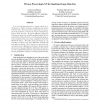686 search results - page 21 / 138 » Secure Two-Party Computation Is Practical |
124
Voted
CRYPTO
2011
Springer
14 years 2 months ago
2011
Springer
Secure computation enables mutually suspicious parties to compute a joint function of their private inputs while providing strong security guarantees. Amongst other things, even i...
121
click to vote
TCC
2009
Springer
16 years 3 months ago
2009
Springer
It is well known that general secure function evaluation (SFE) with information-theoretical (IT) security is infeasible in presence of a corrupted majority in the standard model. ...
126
click to vote
IACR
2011
14 years 2 months ago
2011
We present new candidates for quantum-resistant public-key cryptosystems based on the conjectured difficulty of finding isogenies between supersingular elliptic curves. The main t...
153
Voted
USS
2010
2010
P4P: Practical Large-Scale Privacy-Preserving Distributed Computation Robust against Malicious Users
15 years 19 days ago
In this paper we introduce a framework for privacypreserving distributed computation that is practical for many real-world applications. The framework is called Peers for Privacy ...
124
Voted
ICDM
2007
IEEE
15 years 9 months ago
2007
IEEE
It is not surprising that there is strong interest in kNN queries to enable clustering, classification and outlierdetection tasks. However, previous approaches to privacypreservi...

